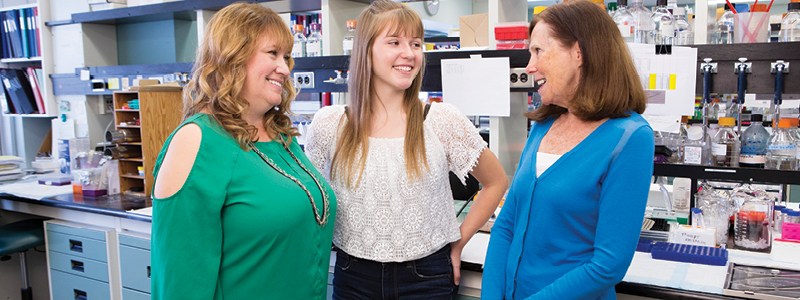Studying the young to learn more about breast cancer
About Us

 Above: Kathleen and Megan McDowell with Dr. Irene Andrulis
Above: Kathleen and Megan McDowell with Dr. Irene Andrulis
The McDowell family knows breast cancer all too well, with three consecutive generations of women being struck by the disease. Now, one of the youngest McDowells is participating in a Lunenfeld-Tanenbaum Research Institute-led study that seeks to establish preventive measures that girls can follow, beginning as early as age six, to reduce their future risk of breast cancer.
Megan McDowell, a 15-year-old with a passion for musical theatre, joined the LEGACY Girls Study when she was just nine years old. She heard about it from her mom, Kathleen, who was treated for breast cancer in 2014. Megan’s grandmother has twice battled breast cancer, and her great-grandmother died of the disease in the 1970s.
The LEGACY study, which also includes four sites in the U.S., is led in Ontario by Dr. Irene Andrulis, a senior investigator at the LTRI. The study has enrolled over 1,000 girls between the ages of six and 13. Like Megan, half come from families with a history of breast cancer, while the other half come from families with no history of the disease.
Legacy researchers aim to better understand the influence of lifestyle, environment and diet on pubertal development in these two cohorts of girls and how these factors might affect their risk of breast cancer later in life. Participants give blood, urine and saliva samples. Every six months, all participants provide body measurements, while girls 10 and older also fill out questionnaires on their pubertal development, exercise history, health knowledge and more.
“We designed LEGACY to find out what factors are involved in breast development and health in addition to genetics — factors such as diet, lifestyle and physical activity,” says Dr. Andrulis, a molecular geneticist.
While the study continues, some intriguing results have already been published. In a June 2017 article in the journal Breast Cancer Research, Dr. Andrulis and her colleagues noted that earlier breast development, as well as a slower tempo between the onset of breast development and menstruation, may be related to a family history of breast cancer.
Naturally, Megan’s mother Kathleen was concerned about raising her daughter’s anxiety surrounding breast cancer by participating in the study. “But we have very open conversations and I don’t think it’s had a negative impact in any way. If anything, it’s been positive,” Kathleen says, noting that Megan is now more aware of healthy lifestyle choices that may lessen her risk of breast cancer.
Ultimately, Megan and her fellow study participants hope to play a role in stopping the painful intergenerational legacy of breast cancer.
"Giving back to the breast cancer community has been great, I hope the study can help improve prevention and treatment."
- Megan, patient